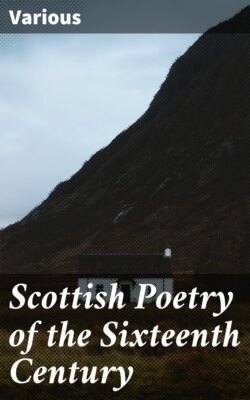Читать книгу Scottish Poetry of the Sixteenth Century - Various - Страница 6
На сайте Литреса книга снята с продажи.
Prolog.
ОглавлениеIn-to the Calendis of Januarie,
Quhen fresche Phebus, be movyng circulair,
Frome Capricorne wes enterit in Aquarie,
With blastis that the branchis maid full bair,
The snaw and sleit perturbit all the air,
And flemit[34] Flora frome every bank and bus[35],
Throuch supporte of the austeir Eolus.
Efter that I the lang wynteris nycht
Had lyne walking[36], in-to my bed, allone,
Throuch hevy thocht, that no way sleip I mycht,
Rememberyng of divers thyngis gone:
So up I rose, and clethit me anone.
Be this, fair Tytane, with his lemis[37] lycht,
Ouer all the land had spred his baner brycht.
With cloke and hude I dressit me belyve[38],
With dowbyll schone, and myttanis on my handis;
Howbeit the air was rycht penetratyve,
Yit fure I furth, lansing ouirthorte[39] the landis
Toward the see, to schorte[40] me on the sandis,
Because unblomit was baith bank and braye[41].
And so, as I was passing be the waye,
I met dame Flora, in dule weid dissagysit[42],
Quhilk in-to May wes dulce and delectabyll;
With stalwart[43] stormis hir sweitnes wes supprisit[44];
Hir hevynlie hewis war turnit in-to sabyll,
Quhilkis umquhile[45] war to luffaris amiabyll.
Fled frome the froste, the tender flouris I saw
Under dame Naturis mantyll lurking law.
The small fowlis in flokkis saw I flee,
To Nature makand greit lamentatioun.
Thay lychtit doun besyde me on ane tree,
Of thair complaynt I had compassioun;
And with ane pieteous exclamatioun
Thay said, “Blyssit be Somer, with his flouris;
And waryit[46] be thow, Wynter, with thy schouris!”
“Allace! Aurora,” the syllie[47] Larke can crye,
“Quhare hes thou left thy balmy liquour sweit
That us rejosit, we mounting in the skye?
Thy sylver droppis ar turnit in-to sleit.
O fair Phebus! quhare is thy hoilsum heit?
Quhy tholis[48] thow thy hevinlie plesand face
With mystie vapouris to be obscurit, allace!
“Quhar art thow May, with June thy syster schene[49],
Weill bordourit with dasyis of delyte?
And gentyll Julie, with thy mantyll grene,
Enamilit with rosis red and quhyte?
Now auld and cauld Januar, in dispyte,
Reiffis[50] frome us all pastyme and plesour.
Allace! quhat gentyll hart may this indure?
“Ouersylit[51] ar with cloudis odious
The goldin skyis of the Orient,
Changeyng in sorrow our sang melodious,
Quhilk we had wount to sing with gude intent,
Resoundand to the hevinnis firmament:
Bot now our daye is changeit in-to nycht.”
With that thay rais, and flew furth of my sycht.
Pensyve in hart, passing full soberlie
Unto the see, fordward I fure anone.
The see was furth, the sand wes smooth and drye;
Then up and doun I musit myne allone[52],
Till that I spyit ane lyttill cave of stone
Heych[53] in ane craig: upwart I did approche
But tarying[54], and clam up in the roche:
And purposit, for passing of the tyme,
Me to defende from ociositie[55],
With pen and paper to register in ryme
Sum mery mater of antiquitie:
Bot Idelnes, ground of iniquitie,
Scho maid so dull my spreitis, me within,
That I wyste nocht at quhat end to begin,
But satt styll in that cove, quhare I mycht see
The wolteryng[56] of the wallis, up and doun,
And this fals warldis instabilytie
Unto that see makkand comparisoun,
And of this warldis wracheit variatioun
To thame that fixis all thair hole intent,
Consideryng quho most had suld most repent.
So, with my hude my hede I happit warme,
And in my cloke I fauldit boith my feit;
I thocht my corps with cauld suld tak no harme,
My mittanis held my handis weill in heit;
The skowland[57] craig me coverit frome the sleit.
Thare styll I satt, my bonis for to rest,
Tyll Morpheus with sleip my spreit opprest.
So, throw the bousteous[58] blastis of Eolus,
And throw my walkyng on the nycht before,
And throw the seyis movyng marvellous,
Be Neptunus, with mony route[59] and rore,
Constraint I was to sleip, withouttin more:
And quhat I dremit, in conclusioun
I sall you tell, ane marvellous Visioun.
[In the company of Dame Remembrance the poet visits the centre of the earth, and there amid the torments of hell discovers the “men of Kirk,” from cardinals to friars, with historic characters, from Bishop Caiaphas and Mahomet to queens and dukes, whose causes of punishment are described. He visits purgatory and the place of unbaptised babes, then passing upward through the four elements and the spheres of the seven planets, from that of the moon, “Quene of the see and bewtie of the nycht,” he reaches the heaven of heavens, and beholds the throne of God, with all its glorious surroundings. Upon leaving heaven Remembrance displays and describes the three parts of the earth to the poet, and after affording him a view of paradise with its four walls of fire, brings him to Scotland. Here he enquires the causes of all the unhappiness which he sees. These are attributed to political turpitude and mismanagement. As Remembrance is speaking a third personage appears on the scene.]
